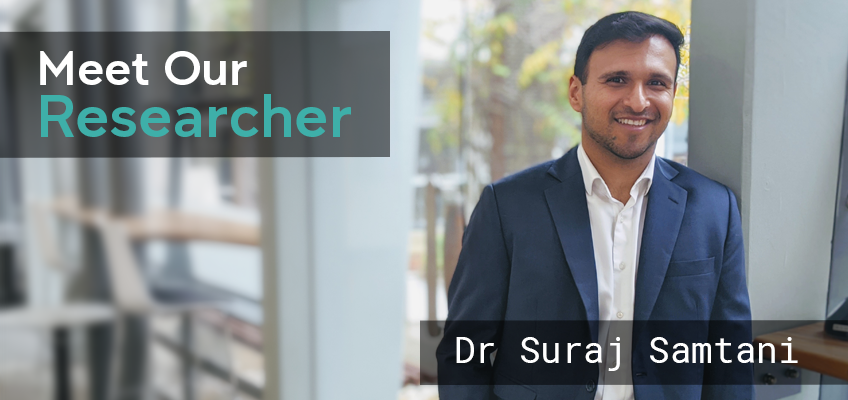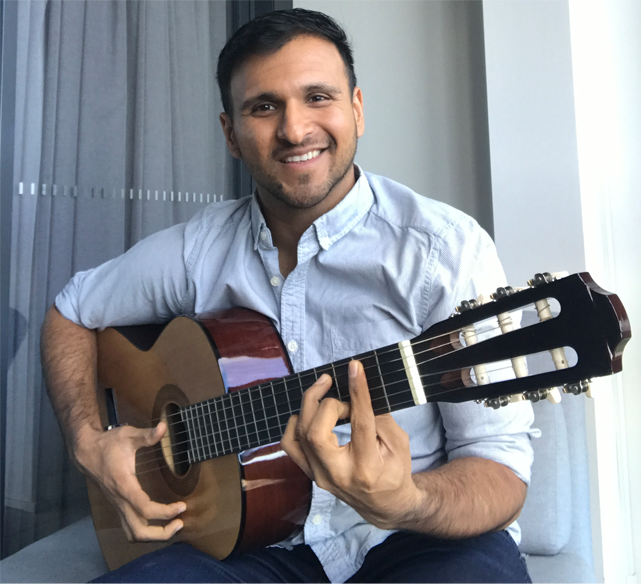19 Jun 2020

CHeBA is concerned with the big picture; achieving successful healthy ageing for all. The Centre’s international collaborative efforts present an opportunity for researchers to investigate these interests on a global scale which has exciting implications. For Dr Suraj Samtani, this brings him one step closer to understanding the implications of social interaction as a protective factor against dementia and cognitive decline.
How did you get into researching the ageing brain?
I have always wanted to have a direct positive impact on people’s lives. This interest led me to complete a combined Master of Clinical Psychology and PhD in Clinical Psychology. As part of my clinical work since then, I have completed neuropsychological assessments and delivered treatments for older adults with dementia, brain injury, anxiety, depression and other psychiatric conditions. Dementia is the single greatest cause of disability in older Australians, one of the leading causes of disability worldwide - and we still have no cure. Having looked at predicting anxiety and depression as part of my PhD research, I wanted to see if we could predict dementia in the population.
Did you experience a ‘defining moment’ which led you to this field?
My great-grandfather was diagnosed with dementia toward the very end of his life. I was around seven years old at the time. I have fond memories of playing cricket with him every day. He was a priest and he used to go to people’s houses to perform ceremonies for special events and he used to walk for two hours a day, even at the age of ninety.
When we moved houses, he was unable to do these things anymore because his social contacts were all in the suburb where we used to live. We noticed his ability to function went downhill very quickly. Within six months he passed away due to dementia.

Do you have any personal interests or activities which are protective behaviours against cognitive decline?
I like to keep my mind and body healthy. I practice daily meditation, do karate and play in an orchestra to keep mentally, physically and socially active. I love playing music with others. It gives me a feeling of joy and connectedness.
What are you currently researching?
I am currently researching the impact of social interactions, specifically how this may be a protective factor against dementia. Ultimately, we want to know how genetics, social interactions and physical and mental health interact to impact our cognitive function across the lifespan. We also want to discover how being socially connected and active changes the structure and function of the brain.
Why is your research important?
I believe what makes us happy and healthy in life are our social interactions. We know that lonely individuals and those with limited social interactions are at higher risk of developing dementia. However, how our social circumstances and interactions impact our physical and cognitive health is still a mystery. In the absence of a cure for dementia, it is important to expand our understanding of modifiable risk factors. We need to identify those at risk and deliver interventions to help prevent dementia and other health conditions associated with ageing.
What do you love about working for CHeBA?
Working at CHeBA has given me the opportunity to think about the big picture. Our Co-Directors Henry and Perminder have directed this through their international scale collaboration with other researchers and institutions. We are in an unprecedented situation as we have the opportunity to combine a great amount of longitudinal studies to form a new and richer data set. For example, I am currently working on a project using longitudinal data from CHeBA’s COSMIC Study. This is a collection of forty studies from around the world that have followed participants for decades.
This is really exciting as no one has had access to so much data before. Hopefully by the end of the project we will be able to answer questions such as ‘what is the relative impact of your genetics, physical health, mental health and social interactions on your cognitive function?’ - not just in Australia but around the world.
What is the ultimate hope you have for your research?
I hope we can better inform healthcare and policy by sharing evidence-based guidelines for maintaining cognitive function in older age. We also want to develop interventions for those with cognitive, psychological, and social difficulties. There is lot of variability in our health outcomes that we can control with modifiable behaviours and lifestyle. These are questions we want to answer to give people a sense of hope.
This interview was undertaken during the COVID-19 self-isolation period. Dr Suraj Samtani found that having video calls with family and friends and continuing activities like orchestra rehearsals online helped him keep socially connected while physically isolated.
Donations are fundamental for critical research to continue following COVID-19.
If you would like to discuss supporting Dr Samtani’s work specifically, or would like information
on leaving a legacy via a Gift in your Will, please contact h.douglass@unsw.edu.au.

Dr Suraj Samtani is a Postdoctoral Fellow and Study Coordinator of the SHARED (Social Health and Reserve in the Dementia Patient Journey) Project at CHeBA. SHARED is an international collaborative study designed to explore how social, biological and, psychological factors interact to predict the onset and course of dementia across the lifespan. Dr Samtani has a PhD in Clinical Psychology and a Master of Psychology (Clinical) from the University of New South Wales in which he focused on the assessment and treatment of cognitive processes such as rumination and worry across a range of psychological disorders. Dr Samtani was greatly influenced by his great-grandfather’s ability to stay socially active in later life and he models this himself by engaging in a range of activities like playing in an orchestra and doing karate.
